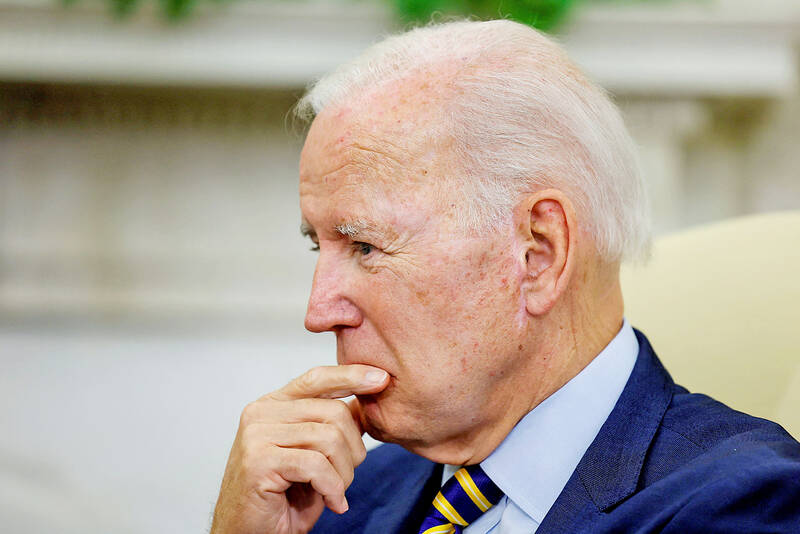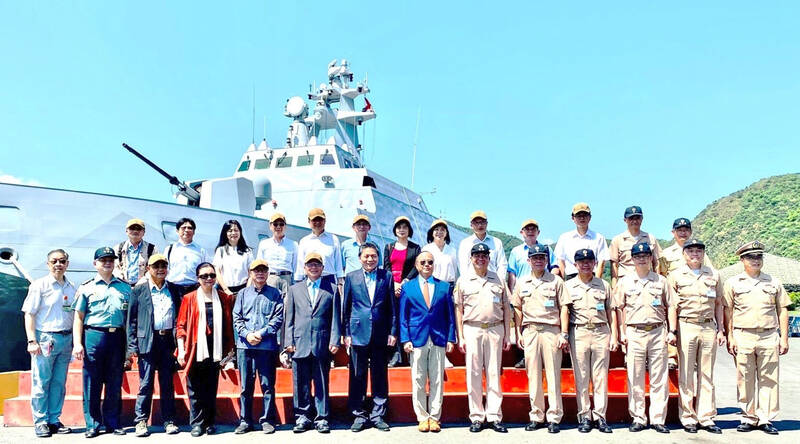US President Joe Biden’s remarks that US troops would help defend Taiwan in the event of a Chinese invasion “speak for themselves,” US National Security Council Indo-Pacific Coordinator Kurt Campbell said on Monday, adding that US policy on Taiwan remains consistent and unchanged.
In a prerecorded interview with the CBS show 60 Minutes that aired on Sunday, Biden told host Scott Pelley that the US would defend Taiwan “if in fact there was an unprecedented attack.”
“So unlike Ukraine, to be clear, sir, US forces — US men and women — would defend Taiwan in the event of a Chinese invasion?” Pelley asked.

Photo: Reuters
“Yes,” Biden said.
After the interview, a White House official said US policy on Taiwan had not changed, according to 60 Minutes.
Campbell said he did not believe it was appropriate to describe the White House statement “as walking back the president’s remarks.”

Photo courtesy of the Control Yuan
“The president’s remarks speak for themselves. I do think our policy has been consistent and is unchanged and will continue,” he said during an online conference organized by the Washington-based think tank Carnegie Endowment for International Peace.
The US’ primary goal is to maintain peace and stability across the Taiwan Strait to secure and stabilize the “status quo,” make sure there is healthy dialogue between the sides and try to avoid escalation, he said.
Representative to the US Hsiao Bi-khim (蕭美琴) told reporters in Washington that she believed Biden “speaks his mind.”
Taipei and Washington would continue to work closely to maintain peace and security in the region, and maintain the “status quo,” she added.
Taiwanese academics said that Biden’s remark is meant to reaffirm Washington’s commitment to Taipei and deter Beijing.
Biden is gradually moving away from “strategic ambiguity,” because he has full confidence in President Tsai Ing-wen’s (蔡英文) pledge to maintain the “status quo,” said Shen Ming-shih (沈明室), director of the National Security Research Division at the government-funded Institute for National Defense and Security Research.
Taiwan’s restraint in response to China’s increasingly assertive military coercion has assured Biden that Taipei would not take any aggressive action, Shen said.
Taiwan’s actions have been defensive in nature and are meant to bolster its sovereignty instead of declaring independence, he added.
Biden’s remarks also express a tougher stance against China following Beijing’s drills around Taiwan last month, with an eye on the US midterm elections, said Shen, a retired army infantry battalion commander.
Chieh Chung (揭仲), an associate defense research fellow at the Chinese Nationalist Party’s (KMT) National Policy Foundation think tank, said he believed the US “would definitely in some way intervene” if China launched a full-scale invasion of Taiwan.
Washington would not sit idly by if Beijing attempted to unilaterally change the “status quo” in the west Pacific by force, because that would undermine the US’ Indo-Pacific strategy and lead other US allies to question its leadership, he said.
However, Chieh said he was concerned because Washington does not have a mutual defense treaty with Taiwan and Beijing has nuclear weapons.
Washington could intervene “too late” and deploy “too few” military resources to aid Taiwan, he added.
During the interview Biden also said that “Taiwan makes their own judgements about their independence. We are not encouraging their being independent. That’s their decision.”
His critics said that China could perceive the comments as tacit support for an independence declaration.
They added that his comments are more likely to aggravate hostilities than overt defense commitments, as Beijing already likely assumes Washington would defend Taiwan.
“It is incoherent to argue that America’s Taiwan policy has not changed while also claiming that the US has a commitment to fight for Taiwan and that Taiwan makes its own judgements about independence,” said Craig Singleton, a China policy expert at the Foundation for Defense of Democracies.
Beijing will likely worry that Biden is suggesting Taiwan can decide for itself whether it is independent, he added.

NATIONAL SECURITY THREAT: An official said that Guan Guan’s comments had gone beyond the threshold of free speech, as she advocated for the destruction of the ROC China-born media influencer Guan Guan’s (關關) residency permit has been revoked for repeatedly posting pro-China content that threatens national security, the National Immigration Agency said yesterday. Guan Guan has said many controversial things in her videos posted to Douyin (抖音), including “the red flag will soon be painted all over Taiwan” and “Taiwan is an inseparable part of China,” while expressing hope for expedited “reunification.” The agency received multiple reports alleging that Guan Guan had advocated for armed reunification last year. After investigating, the agency last month issued a notice requiring her to appear and account for her actions. Guan Guan appeared as required,

A strong cold air mass is expected to arrive tonight, bringing a change in weather and a drop in temperature, the Central Weather Administration (CWA) said. The coldest time would be early on Thursday morning, with temperatures in some areas dipping as low as 8°C, it said. Daytime highs yesterday were 22°C to 24°C in northern and eastern Taiwan, and about 25°C to 28°C in the central and southern regions, it said. However, nighttime lows would dip to about 15°C to 16°C in central and northern Taiwan as well as the northeast, and 17°C to 19°C elsewhere, it said. Tropical Storm Nokaen, currently

‘NATO-PLUS’: ‘Our strategic partners in the Indo-Pacific are facing increasing aggression by the Chinese Communist Party,’ US Representative Rob Wittman said The US House of Representatives on Monday released its version of the Consolidated Appropriations Act, which includes US$1.15 billion to support security cooperation with Taiwan. The omnibus act, covering US$1.2 trillion of spending, allocates US$1 billion for the Taiwan Security Cooperation Initiative, as well as US$150 million for the replacement of defense articles and reimbursement of defense services provided to Taiwan. The fund allocations were based on the US National Defense Authorization Act for fiscal 2026 that was passed by the US Congress last month and authorized up to US$1 billion to the US Defense Security Cooperation Agency in support of the

A Vietnamese migrant worker yesterday won NT$12 million (US$379,627) on a Lunar New Year scratch card in Kaohsiung as part of Taiwan Lottery Co’s (台灣彩券) “NT$12 Million Grand Fortune” (1200萬大吉利) game. The man was the first top-prize winner of the new game launched on Jan. 6 to mark the Lunar New Year. Three Vietnamese migrant workers visited a Taiwan Lottery shop on Xinyue Street in Kaohsiung’s Gangshan District (崗山), a store representative said. The player bought multiple tickets and, after winning nothing, held the final lottery ticket in one hand and rubbed the store’s statue of the Maitreya Buddha’s belly with the other,